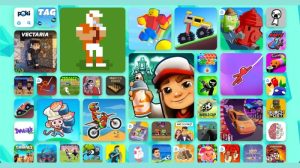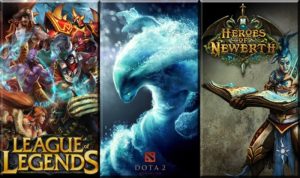
Ever wondered about the captivating world of online virtual games? From their humble beginnings to their current global dominance, these digital playgrounds have revolutionized entertainment, social interaction, and even professional fields. We’ll explore the evolution of online gaming, delve into the intricacies of game development, and uncover the secrets behind successful monetization strategies. Get ready for a thrilling journey through pixels and possibilities!
This exploration will cover everything from the explosive popularity of various genres like MMORPGs and battle royales to the unique challenges faced by developers in creating immersive experiences. We’ll examine how different games cater to diverse audiences, including the burgeoning market of games designed specifically for girls, and even venture into the world of online casinos, discussing responsible gambling practices and the legal landscape.
Buckle up, gamers!
Online Game Development Process

Creating a successful online virtual game is a complex undertaking, requiring a coordinated effort from a diverse team of skilled professionals and a meticulous approach to each stage of development. From initial concept to final launch and beyond, the process demands careful planning, iterative design, and robust testing.
Stages of Online Game Development
The development lifecycle typically progresses through several key stages: Concept and Pre-Production, Production, Alpha and Beta Testing, and Launch and Post-Launch Support. Concept and Pre-Production involves defining the game’s core mechanics, target audience, and overall vision. Production is where the bulk of the development occurs, encompassing programming, art creation, level design, and sound engineering. Alpha and Beta testing allows for crucial feedback and bug fixing before release.
Finally, Launch and Post-Launch Support handles the game’s official release and subsequent updates, patches, and community management. Each stage is critical to the final product’s success.
Roles in Online Game Development
A successful online game relies on the expertise of various professionals. Programmers write the code that brings the game to life, implementing game mechanics, networking features, and user interfaces. Game designers craft the rules, levels, and overall gameplay experience, ensuring it’s engaging and balanced. Artists create the visual assets, from character models and environments to user interface elements, establishing the game’s aesthetic appeal.
Sound designers compose music and implement sound effects, enhancing the immersive experience. Project managers oversee the entire development process, ensuring tasks are completed on time and within budget. Quality assurance (QA) testers rigorously test the game, identifying and reporting bugs before release.
Innovative Technologies in Online Game Development
Modern online game development leverages cutting-edge technologies to enhance realism and player experience. Unreal Engine 5 and Unity are popular game engines providing powerful tools for creating high-fidelity graphics and immersive environments. Cloud computing services, like AWS and Google Cloud, facilitate scalable server infrastructure, handling large numbers of concurrent players. Procedural generation algorithms create vast and diverse game worlds automatically, reducing development time and increasing replayability.
Virtual Reality (VR) and Augmented Reality (AR) technologies are increasingly integrated, offering players new and engaging ways to interact with game worlds. For example, “No Man’s Sky” utilizes procedural generation to create a nearly infinite universe, while games like “Half-Life: Alyx” showcase the immersive potential of VR technology.
Challenges in Online Game Development and Their Solutions
Online game development presents numerous challenges. Balancing game mechanics to create a fair and engaging experience requires careful design and extensive testing. Maintaining server stability and security is crucial for a positive player experience, requiring robust infrastructure and security protocols. Managing a large and diverse development team requires effective communication and project management strategies. Meeting deadlines and staying within budget demands meticulous planning and efficient resource allocation.
Solutions include agile development methodologies, regular team communication, thorough testing procedures, and robust server architecture. For example, regular updates and community feedback can address balance issues and improve the player experience. Investing in robust security measures helps prevent hacking and data breaches.
Online Game Development Workflow
A flowchart illustrating the typical workflow would begin with the “Concept & Design” phase, branching into “Pre-Production Planning,” which includes tasks like market research, budget allocation, and team formation. This leads to the “Production” phase, encompassing programming, art creation, level design, and sound design. Simultaneously, a “Testing” branch would run parallel to Production, incorporating unit testing, integration testing, and alpha/beta testing.
Once testing is complete, the process moves to “Deployment and Launch,” followed by “Post-Launch Support,” which involves updates, bug fixes, and community management. The entire process is iterative, with feedback loops from each stage influencing subsequent phases.
Free Online Games and Monetization Strategies
The world of free-to-play online games is a fascinating blend of creative game design and shrewd business models. Millions of players enjoy these games daily, but the question of how developers make money without upfront purchases is a key element of their success. This section delves into the various monetization strategies employed, their effectiveness, and the ethical considerations involved.
We’ll explore successful examples and analyze their impact on player engagement.
Free-to-play games represent a significant portion of the online gaming market, relying on various strategies to generate revenue. These strategies are often layered, combining different approaches to maximize profitability while maintaining player satisfaction. A successful model carefully balances the need for profit with the desire to provide a fun and engaging experience for players.
Successful Free-to-Play Games and Their Monetization Models
Many successful free-to-play games have demonstrated the viability of various monetization models. Understanding these models helps to illustrate the different approaches and their relative effectiveness.
Several successful examples demonstrate the diverse approaches to monetizing free-to-play games. These examples showcase the various combinations and strategies employed to achieve profitability while maintaining a positive player experience. Analyzing these cases allows for a better understanding of what works and what doesn’t in the competitive free-to-play market.
- Fortnite: Employs a battle pass system, offering cosmetic items and other benefits to players who purchase the pass. It also features an in-game store selling additional cosmetic items.
- League of Legends: Uses a “champion” model where players can unlock new characters through gameplay or purchase them directly. Cosmetic items and other in-game purchases are also available.
- Candy Crush Saga: Relies heavily on in-app purchases to continue gameplay after running out of “lives.” This model emphasizes a casual, easily accessible experience.
- Roblox: A platform for user-created games, Roblox monetizes through in-game purchases (Robux) used to buy virtual items and experiences within the games hosted on the platform. Developers also earn a percentage of sales from their creations.
Comparison of Monetization Strategies
Different monetization strategies cater to various player preferences and game designs. The optimal strategy often depends on the specific game and its target audience.
A direct comparison reveals the strengths and weaknesses of each approach. Understanding these differences allows developers to make informed decisions about which model, or combination of models, best suits their game.
| Monetization Strategy | Description | Pros | Cons | Example |
|---|---|---|---|---|
| In-App Purchases (IAP) | Players purchase virtual goods, upgrades, or features. | High revenue potential, readily integrated. | Can feel exploitative if not implemented carefully, potential for “pay-to-win” mechanics. | Candy Crush Saga |
| Advertisements | Displaying ads within the game. | Relatively low effort to implement, can generate passive income. | Can be intrusive and negatively impact the player experience. | Many free mobile games |
| Subscriptions | Players pay a recurring fee for access to premium content or features. | Predictable revenue stream, fosters player loyalty. | Requires a compelling value proposition to justify the cost. | Some MMOs offer subscription tiers |
Ethical Considerations in Monetizing Free Online Games
The ethical implications of monetization strategies are crucial, focusing on fairness, transparency, and avoiding manipulative tactics.
Ethical considerations are paramount to maintaining a positive player experience and avoiding negative repercussions. Transparency and fairness are key to building trust with the player base.
“The line between ethical and unethical monetization often blurs, particularly when it comes to the potential for ‘pay-to-win’ mechanics or manipulative design choices.”
Impact of Monetization Models on Player Engagement and Retention
The chosen monetization model significantly impacts player engagement and retention rates. A poorly implemented system can lead to player frustration and churn.
The relationship between monetization and player retention is complex and multifaceted. Balancing revenue generation with player satisfaction is crucial for long-term success.
For example, a game with overly aggressive IAPs might generate high short-term revenue but alienate players, leading to lower retention. Conversely, a game with a well-designed and fair monetization system can cultivate a loyal player base that generates consistent revenue over time. This demonstrates the need for careful consideration and strategic planning in the monetization process.
The Online Casino Landscape

The world of online casinos is a vibrant and complex ecosystem, encompassing thrilling games, sophisticated marketing, and a constantly evolving legal framework. Understanding the interplay between free spins, affiliate marketing, and legal regulations is crucial for both players and industry stakeholders. This section delves into these key aspects, providing insights into the mechanics and implications of this rapidly growing sector.
Free Spins: A Player Acquisition Tool
Free spins serve as a powerful incentive for attracting new players and retaining existing ones. Offered as bonuses upon registration or as rewards for loyalty, they allow players to try out games without risking their own money. This risk-free experience can lead to engagement and potentially, further deposits. The number of free spins offered, the games they apply to, and any wagering requirements attached, all play a crucial role in their effectiveness as a marketing tool.
Casinos strategically utilize free spins to promote new game releases or to encourage players to explore different game categories. For example, a casino might offer 50 free spins on a new slot game to entice players to try it out. The success of a free spin promotion is often measured by its conversion rate – the percentage of players who utilize the free spins and subsequently make a deposit.
Online Casino Affiliate Marketing
Online casino affiliates act as intermediaries, driving traffic to online casinos in exchange for a commission on player deposits or revenue generated. These affiliates employ a variety of marketing strategies, including search engine optimization (), paid advertising (PPC), social media marketing, and content marketing (e.g., reviews, guides). A successful affiliate will identify a niche audience interested in online casinos and tailor their marketing materials to resonate with their target demographic.
For instance, an affiliate might specialize in attracting high-roller players through exclusive promotions or focus on a specific geographic region with targeted advertising campaigns. The commission structure varies depending on the agreement between the affiliate and the casino, and can range from a percentage of net revenue to a fixed payment per acquired player.
Legal Frameworks and Regulations for Online Gambling
The legal landscape surrounding online gambling differs significantly across jurisdictions. Some countries have fully legalized and regulated online casinos, while others maintain a complete ban. Many countries fall somewhere in between, with varying degrees of regulation and licensing requirements. For example, the United Kingdom has a robust regulatory framework overseen by the UK Gambling Commission, requiring casinos to obtain a license and adhere to strict player protection measures.
In contrast, online gambling is illegal in many US states, although some states have legalized specific forms of online gambling, such as sports betting or lottery. The legal framework often dictates the types of games offered, the advertising permitted, and the level of player protection required.
Licensing and Regulatory Requirements
The licensing and regulatory requirements for online casinos vary considerably based on the jurisdiction. Generally, obtaining a license involves a rigorous application process, including background checks, financial audits, and demonstrating compliance with various regulations. Licenses are typically issued by a national gambling authority or a specific gaming jurisdiction, such as the Malta Gaming Authority (MGA) or the Curaçao eGaming licensing authority.
These authorities set standards for responsible gambling, data protection, and game fairness. The cost of obtaining and maintaining a license can be substantial, and compliance with regulations requires ongoing investment in security and responsible gaming measures. Reputable online casinos will proudly display their licensing information on their website.
Responsible Gambling Practices and Resources
Responsible gambling is paramount in the online casino industry. Operators are increasingly implementing measures to promote responsible gaming, including setting deposit limits, self-exclusion options, and providing access to resources for problem gamblers. These resources often include links to organizations such as GamCare (UK), Gamblers Anonymous, and the National Council on Problem Gambling (US). Furthermore, many online casinos incorporate tools that allow players to track their spending, set time limits, and take breaks from gaming.
The promotion of responsible gambling is not just an ethical consideration but is often a regulatory requirement, reflecting a growing awareness of the potential risks associated with gambling.
Gambling Games and Online Casino Advice
The allure of online casinos is undeniable, offering a vast array of games and the potential for significant wins. However, it’s crucial to approach online gambling with awareness and responsibility. This section will explore various online gambling games, provide advice for responsible play, and highlight the potential risks involved. Understanding these aspects is key to maximizing enjoyment while minimizing potential harm.
Online Casino Game Types and Mechanics
Online casinos offer a diverse selection of games, each with its unique rules and mechanics. Slot machines, for instance, rely on random number generators (RNGs) to determine outcomes, offering various paylines and bonus features. Poker, a game of skill and strategy, involves players betting on the strength of their hand against others. Blackjack, a card game, requires players to strategize to get as close to 21 as possible without exceeding it, playing against the dealer.
Roulette involves betting on where a ball will land on a spinning wheel, combining chance and strategic wagering. Each game presents different odds and levels of skill involvement, demanding a distinct approach.
Responsible Online Gambling Practices
Responsible online gambling hinges on establishing clear boundaries and adhering to them. Setting a budget beforehand is paramount; determine how much you can afford to lose without impacting your financial stability. Sticking to this budget is crucial, regardless of wins or losses. Managing risk involves understanding the odds of each game and avoiding chasing losses. Taking regular breaks and setting time limits prevents excessive play and helps maintain perspective.
Recognizing gambling as a form of entertainment, not a source of income, is essential for healthy engagement.
Potential Risks and Downsides of Online Gambling
Online gambling, while entertaining, carries inherent risks. Financial losses are a significant concern; addiction can lead to severe debt and financial ruin. The addictive nature of gambling can negatively impact mental health, leading to stress, anxiety, and depression. Furthermore, the anonymity of online gambling can exacerbate these issues, making it harder to seek help. The potential for fraud and scams is also present, with some operators engaging in dishonest practices.
Responsible play and awareness of these risks are crucial to mitigating potential harm.
Strategies for Minimizing Losses and Maximizing Enjoyment
Minimizing losses and maximizing enjoyment requires a balanced approach. Setting realistic win goals and sticking to them prevents overspending. Choosing games with favorable odds and understanding their mechanics can improve your chances. Utilizing bonuses and promotions responsibly can enhance your playing experience without exceeding your budget. Practicing good bankroll management, spreading bets across different games, and avoiding emotional decision-making are also key strategies.
Remember, the primary goal should be entertainment, not financial gain.
Resources for Problem Gamblers
It’s crucial to acknowledge that problem gambling is a serious issue. Seeking help is a sign of strength, not weakness. Several resources are available to support individuals struggling with gambling addiction:
- GamCare: Offers confidential advice, support, and resources for problem gamblers and their families.
- National Council on Problem Gambling (NCPG): Provides information, resources, and referrals to treatment centers across the United States.
- BeGambleAware: A UK-based organization offering information, advice, and support for problem gamblers.
- Gambling Anonymous (GA): A fellowship of recovering problem gamblers who support each other through meetings and shared experiences.
Closing Notes
From the vibrant landscapes of massively multiplayer online games to the strategic depths of competitive esports, the world of online virtual games continues to expand at an astonishing pace. We’ve journeyed through its evolution, explored its development processes, and considered the ethical and economic aspects of its success. Whether you’re a seasoned gamer, a curious observer, or an aspiring developer, understanding the dynamics of this ever-evolving digital realm is key to navigating its exciting future.
So, grab your controller (or mouse!), and prepare for the next level!
General Inquiries
What are the health risks associated with excessive online gaming?
Excessive gaming can lead to eye strain, carpal tunnel syndrome, sleep deprivation, and social isolation. Maintaining a healthy balance between gaming and other activities is crucial.
How can I choose age-appropriate online games for my child?
Check the game’s ESRB (Entertainment Software Rating Board) rating or equivalent in your region. Read reviews and look for parental control options.
Are there any free online games that don’t rely on microtransactions?
Yes, many free-to-play games offer enjoyable experiences without requiring in-app purchases. Look for games with alternative monetization methods like advertising or optional cosmetic purchases.
What are the career opportunities in the online gaming industry?
The industry offers a wide range of roles, including game designers, programmers, artists, marketers, and esports professionals.







